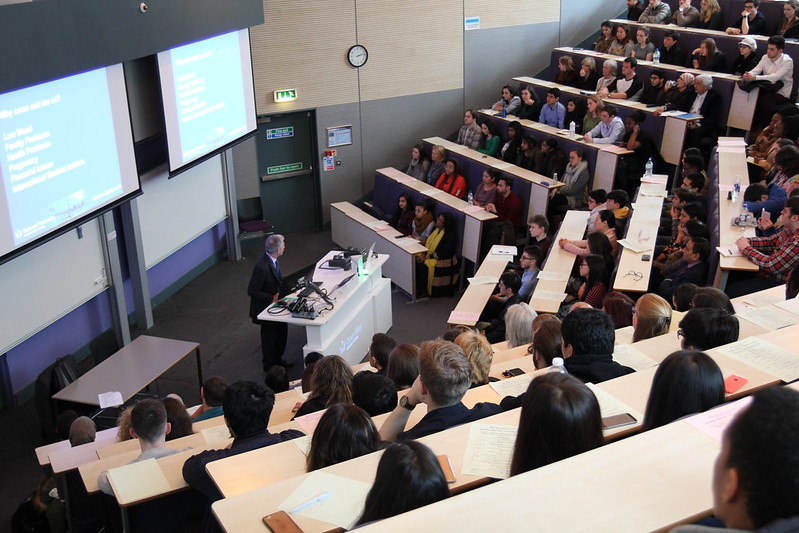Tuition fees
The information is for all students – undergraduate, postgraduate and international.
 On this page we explain:
On this page we explain:
- How much are tuition fees at Queen Mary?
- How to pay tuition fees
- What happens if you cannot pay tuition fees?
- How Queen Mary assesses tuition fee status
How much are tuition fees at Queen Mary
Tuition fees are listed on the course finder:
Undergraduate Home fee payers
If you are eligible for a Student Finance Tuition Fee Loan, this will be paid to the university on your behalf. If your Student Finance is delayed and has not been processed you can usually still fully enrol without confirmation of a Tuition Fee Loan. However please be aware that as soon as you enrol you are liable for the tuition fee, so if your funding is refused you will still be liable to pay. If you are unsure whether you will be eligible for a Tuition Fee loan please check the eligibility section of our Government Student Finance webpage before you decide whether to enrol.
If you are paying your own tuition fee, how to pay is explained on the Queen Mary Payment of Tuition Fees page. You need to pay at least 25% of the total amount for the academic year before enrolling, as well as setting up a payment plan to pay the remaining amount in seven monthly instalments between October and April. You need to ensure you will have enough money to pay your fees for the whole course, by the university deadlines explained in the University Tuition Fee Regulations. Once you enrol, if you run out of money there are no university hardship funds which can pay your tuition fees. If you need advice about funding your studies, contact a Welfare Adviser.
If you miss tuition fee payment deadlines you are liable to be deregistered from Queen Mary. Please read our guidance on deregistration.
Postgraduate Home fee payers
Before you start your course, you need to ensure you will have enough money to pay your tuition fees for the whole course, by the deadlines (see below). Once you start your course, if you run out of money there are no university hardship funds which can pay your tuition fees. See our Postgraduate Funding guidance.
You can pay your tuition fees in a variety of ways – these are explained on the Payment of Tuition Fees page of the Queen Mary website. There is a £50 charge for paying in instalments.
Taught Postgraduate students can pay tuition fees in full at or before enrolment or arrange a Tuition Fee Payment Plan to pay fees in 2 instalments with 50% paid at or before enrolment. If you enrol in September then the remaining 50% must be paid by 31st January. If you enrol in January then the remaining 50% must be paid by 30 April. If you have been awarded a government Postgraduate loan you can make a different payment arrangement – this is explained on the payment of tuition fees page under ‘Postgraduate Loan payment options’, including some examples of how this works.
Research students can pay 100% of fees before enrolment, or pay a £50 charge to split payments into two instalments, provided enrolment is before 1st February. If you pay in instalments, 50% must be paid before or at enrolment and the remaining 50% by the last working day of the 4th month after enrolment. If you enrol after 1st February you have to pay in full at enrolment. If you have been awarded a Government Postgraduate loan you can make a different payment arrangement – this is explained on the he payment of tuition fees page under ‘Postgraduate Loan payment options’, including some examples of how this works.
The Tuition Fee Payment Plan page has information about how to set up a payment plan agreement. If you have any queries, please email fees-plan@qmul.ac.uk There is more information in the Queen Mary tuition fee regulations. If your tuition fee is at a certain level there is a discount for prompt payment.
If you receive sponsorship to pay your tuition fees, the Queen Mary tuition fee regulations explain what evidence is required. Where the sponsor is paying only part of the fees, you must pay the balance due before or at enrolment, according to the same arrangements that apply to self-funding students.
Overseas fee payers
Please read the guidance on the Queen Mary webpage.
What happens if you cannot pay tuition fees?
If you cannot pay your fees to Queen Mary at the required time, you may be de-registered from Queen Mary and you will still owe the amount of tuition fees that are due, even if you have not completed the academic year or the full duration of your programme.
Once you enrol onto your programme of study at Queen Mary, your fee status is very unlikely to change. Before enrolling you should be certain that you can pay your tuition fees and living costs for the duration of the programme.
If you cannot pay tuition fees, you may need to apply for an interruption of study (this means that you take some time out of your studies, and your place on the programme is held open for you to return to) while you secure the funds that you need to pay tuition fees. When you return from an interruption your fee status would normally remain as Overseas.
If you don’t think you will be able to secure the required funds in future, you may need to withdraw from Queen Mary. If you wish to re-apply to Queen Mary after withdrawing, if at that time you are able to meet the eligibility requirements for Home fee status, Queen Mary might require you to take a period of time out before you can re-apply. The Admissions Team can advise you about this. Also there is no guarantee that you will be offered a place at Queen Mary again.
For information about interrupting, withdrawing and de-registration please read our webpages.
How does Queen Mary assess tuition fee status?
Like all universities, Queen Mary University of London charges two different rates of tuition fees for each individual programme of study: Home and Overseas. This is known as ‘fee status’. The regulations that define which groups of students all UK universities must charge the 'home' rate of fee to, are set out in legislation made by the UK government. UKCISA explain the categories of eligibility for home fee status on their website. Queen Mary makes fee status decisions in line with this legislation, with the exception of a Queen Mary concession for undergraduate asylum seekers (non Medical or Dental courses only).
Eligibility for 'home' fee status depends on key things such as:
- Your nationality
- Your immigration status in the UK
- Where you are living on the first day of the first academic year of your course (this is not the actual 'first day' of the course. For courses that start in September this is always the 1st September immediately before you begin your course and for courses that start in January it is always 1 January immediately before you begin your course)
- How long you have lived in the UK
- The type and purpose of your residence in the UK. There are special rules if you normally live in the UK but you have been living somewhere else temporarily (eg because of your parent's temporary employment overseas)
Fee status is decided by the Admissions Team at Queen Mary. How they make this assessment is explained on the Admissions webpage, including how to appeal the fee status decision if you believe it is incorrect. If after following the process on the webpage you are not able to resolve your fee status appeal, and if you believe you meet one of the categories of eligibility for Home fee status on the UKCISA website, you can contact a Welfare Adviser for advice about your eligibility for 'home' fee status and Student Finance.
You will be notified of your fee status before you begin your studies at Queen Mary and you will be required to accept your fee status during the enrolment process. This fee status will normally apply for the duration of your programme, because eligibility requirements relate to your circumstances on 1 September or 1 January in the year that you first enrol. If you are an offer holder assessed as an Overseas student but think you will meet the Home fee status requirements at a future point, you can contact the Admissions team to ask whether you can defer your place and start the course after you meet the Home fee status requirements. Once you enrol, if you cannot pay the tuition fees you are liable for, please read ‘What happens if you cannot pay tuition fees’.
There are some very limited circumstances in which a student can become eligible for Home fees part way through their programme. These are explained in the UKCISA guidance. Contact a Welfare Adviser to discuss your fee status options if you pay the overseas rate of tuition fee but have a change of circumstance during your course, for example you obtain a settled status like Indefinite Leave to Remain. You can contact us by completing our Contact Form.
Please check the Queen Mary Admissions webpage for information about requesting a change of fee status and the deadline for doing this.
It is important to be aware that the Queen Mary assessment of fee status and a decision by Student Finance England (or other funding body) to award student funding are not linked and are made independently of each other. So, it is possible to be deemed liable for Overseas fees but ineligible for Student Finance, or vice versa.



